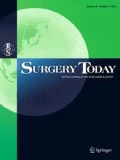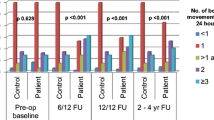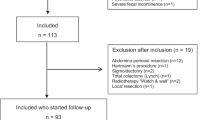Abstract
Purpose
We investigated the functional outcome and health-related quality of life (QOL) of patients who underwent a surgical resection of colorectal cancer, and reviewed the efficacy of probiotics for improving bowel function.
Methods
A questionnaire was mailed to 193 patients. Questionnaires contained the Medical Outcomes Study Short-Form 36-Item Health Survey and the European Organization for Research and Treatment of Cancer Quality of Life Questionnaire C30 as QOL scores, the Wexner incontinence score, and original questionnaire items about bowel functions. Probiotics, containing Bacillus natto and Lactobacillus acidophilus, were given to 77 patients for 3 months; after 3 months of treatment, the same questionnaire was administered. The results were analyzed by location of the resected cancer: rectal, colonic, right, and left.
Results
In the rectal group, defecation frequency, anal pain, and the Wexner score were significantly worse than in the colonic group. In the right group, the fecal form was looser and nighttime defecation frequency was higher than those of the left group. Three items in the QOL score of the right group were significantly worse compared with the left group. Functional outcome including defecation frequency, feeling of incomplete defecation, and five items in the QOL score were significantly improved after taking probiotics. Improvement in functional outcome and/or QOL was observed in all groups.
Conclusions
Not only rectal resection but also rightside colectomy affected bowel dysfunction. Probiotics could be an effective treatment for improvement in functional outcome and QOL after colorectal resection.
Similar content being viewed by others
References
Reuter G. Present and future of probiotics in Germany and central Europe. Biosci Microflora 1997;16:43–51.
Quigley EM. Bacteria: a new player in gastrointestinal motility disorders — infection, bacterial overgrowth, and probiotics. Gastroenterol Clin North Am 2007;36:735–748.
Floch MH, Madsen KK, Jenkins DJ, Guandalin S, Katz JA, Onderdonk A, et al. Recommendation of probiotic use. J Clin Gastroenterol 2006;40:275–278.
Kato K, Mizuno S, Umesaki Y, Ishii Y, Sugitani M, Imaoka A, et al. Randomized placebo-controlled trial assessing the effect of bifidobacteria-fermented milk on active ulcerative colitis. Aliment Pharmacol Ther 2004;20:1133–1141.
Eckburg PB, Relman DA. The role of microbes in Crohn’s disease. Clin Infect Dis 2007;44:252–262.
Camilleri M. Probiotics and irritable bowel syndrome: rationale, putative mechanisms, and evidence of clinical efficacy. J Clin Gastroenterol 2006;40:264–269.
Lewis WG, Holdsworth PJ, Stephenson BM, Finan PJ, Johnston D. Role of the rectum in the physiological and clinical results of coloanal and colorectal anastomosis after anterior resection for rectal cancer. Br J Surg 1992;79:1082–1086.
Vironen JH, Kairaluoma M, Aalto AM, Kellokumpu IH. Impact of functional results on quality of life after rectal surgery. Dis Colon Rectum 2006;49:568–578.
Fazio VW, Zutshi M, Remzi FH, Parc Y, Ruppert R, Furst A, et al. A randomized multicenter trial to compare long-term functional outcome, quality of life, and complications of surgical procedure for low rectal cancers. Ann Surg 2007;246:481–490.
Philipps E, Braitman LE, Stites S, Leighton JC. Quality of life and symptom attribution in long-term colon cancer survivors. J Eval Clin Pract 2008;14:254–258.
Ware JE, Sherbourne CD. The MOS 36-Item Short Form Health Status Survey (SF-36): conceptual framework and item selection. Med Care 1993;30:473–482.
Aaronson NK, Ahmedzai S, Bergman B, Bullinger M, Cull A, Duez NJ, et al. The European Organization for Research and Treatment of Cancer QLQ-C30: a quality of life instrument for use in international clinical trial in oncology. J Natl Cancer Inst 1993;85:365–376.
Jorge JM, Wexner SD. Etiology and management of fecal incontinence. Dis Colon Rectum 1993;36:77–97.
Suzuki H, Amano S, Fujioka M, Honzumi M. Anorectal pressure and rectal compliance after low anterior resection. Br J Surg 1980;67:655–657.
Batignani G, Monaci I, Ficari F, Tonelli F. What affects continence after anterior resection of the rectum? Dis Colon Rectum 1991;34:329–335.
Malbert CH. The ileocolic sphincter. Neurogastroenterol Motil 2005;17:41–49.
Mitchell JE, Breuer RI, Zuckerman L, Berlin J, Schilli R, Dunn JK. The colon influences ileal resection diarrhea. Dig Dis Sci 1980;25:33–41.
Richardson JD, Griffen WO. Ileocecal valve substitutes as bacteriologic barriers. Am J Surg 1972;123:149–153.
Shafik A, El-Shibai O, Shafik AA. Physiological assessment of the function of the ileocecal junction with evidence of ileocecal junction reflex. Med Sci Monitor 2002;8:629–635.
Thompson JS, Quigley EM, Adrian TE, Path FR. Role of the ileocecal junction in the mortar response to intestinal resection. J Gastrointest Surg 1998;2:174–185.
Cazet JG, Kopp J. The surgical significance of the ileocecal junction. Surgery 1964;56:565–573.
Yasuno M, Mori T, Takahashi K. Our new proposal for the length of the bowel to be resected in the colorectal cancer operation — the study of the bowel habits after the right hemicolectomy and the low anterior resection (in Japanese with English abstract). Nihon Syokakigeka Gakkaizashi (Jpn J Gastroenterol Surg) 1997;30:2112–2116.
Nakamura T, Ohya M, Ishikawa H. Total and segmental colonic transit times in patients after anterior resection of sigmoid colon and rectal cancer — their relationship with postoperative abdominal symptoms and anal function (in Japanese with English abstract). Nihon Daichokoumonbyo Gakkaizashi (J Jpn Soc Coloproctol) 1998;50:17–32.
Rao GN, Drew PJ, Lee PWR, Monson JRT, Duthie GS. Anterior resection syndrome is secondary to sympathetic denervation. Colorectal Dis 1996;11:250–258.
Hollabaugh RS, Steiner MS, Sellers KD, Samm BJ, Dmochowski RR. Neuroanatomy of the pelvis — implications for colonic and rectal resection. Dis Colon Rectum 2000;43:1390–1397.
Kawahara H, Yanaga K. The herbal medicine Dai-Kenchu-To directly stimulates colonic motility. Surg Today 2009;39:175–177.
Author information
Authors and Affiliations
Additional information
The data concerning the effects of probiotics on the QOL have previously been published in part (in Japanese) in the Journal of the Japan Society of Coloproctology 2008;61: 389–95.
Rights and permissions
About this article
Cite this article
Ohigashi, S., Hoshino, Y., Ohde, S. et al. Functional outcome, quality of life, and efficacy of probiotics in postoperative patients with colorectal cancer. Surg Today 41, 1200–1206 (2011). https://doi.org/10.1007/s00595-010-4450-6
Received:
Accepted:
Published:
Issue Date:
DOI: https://doi.org/10.1007/s00595-010-4450-6




